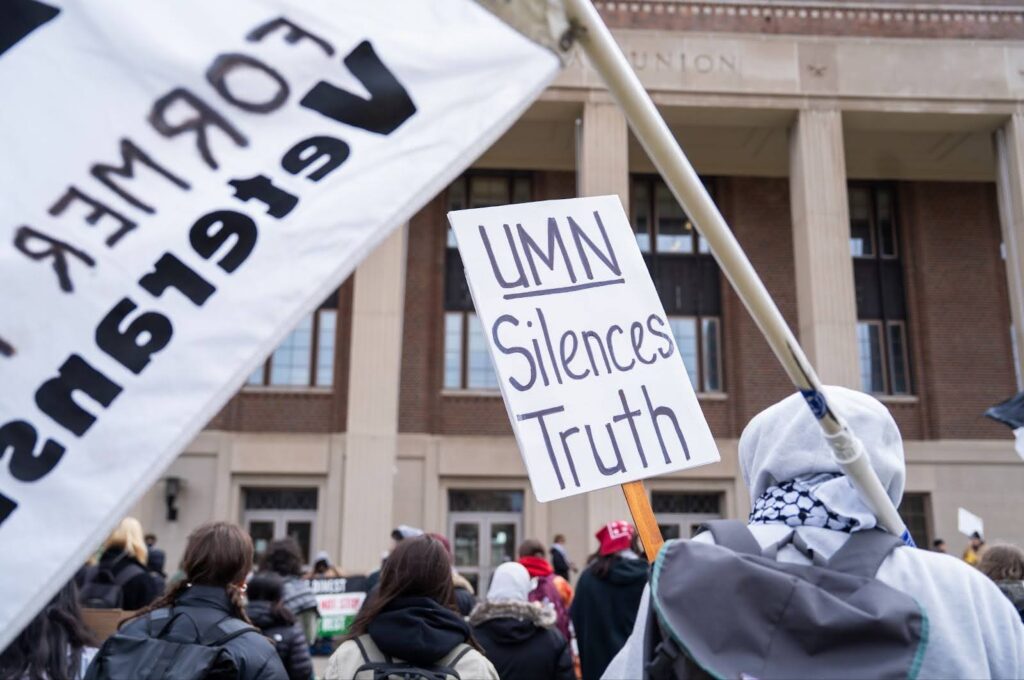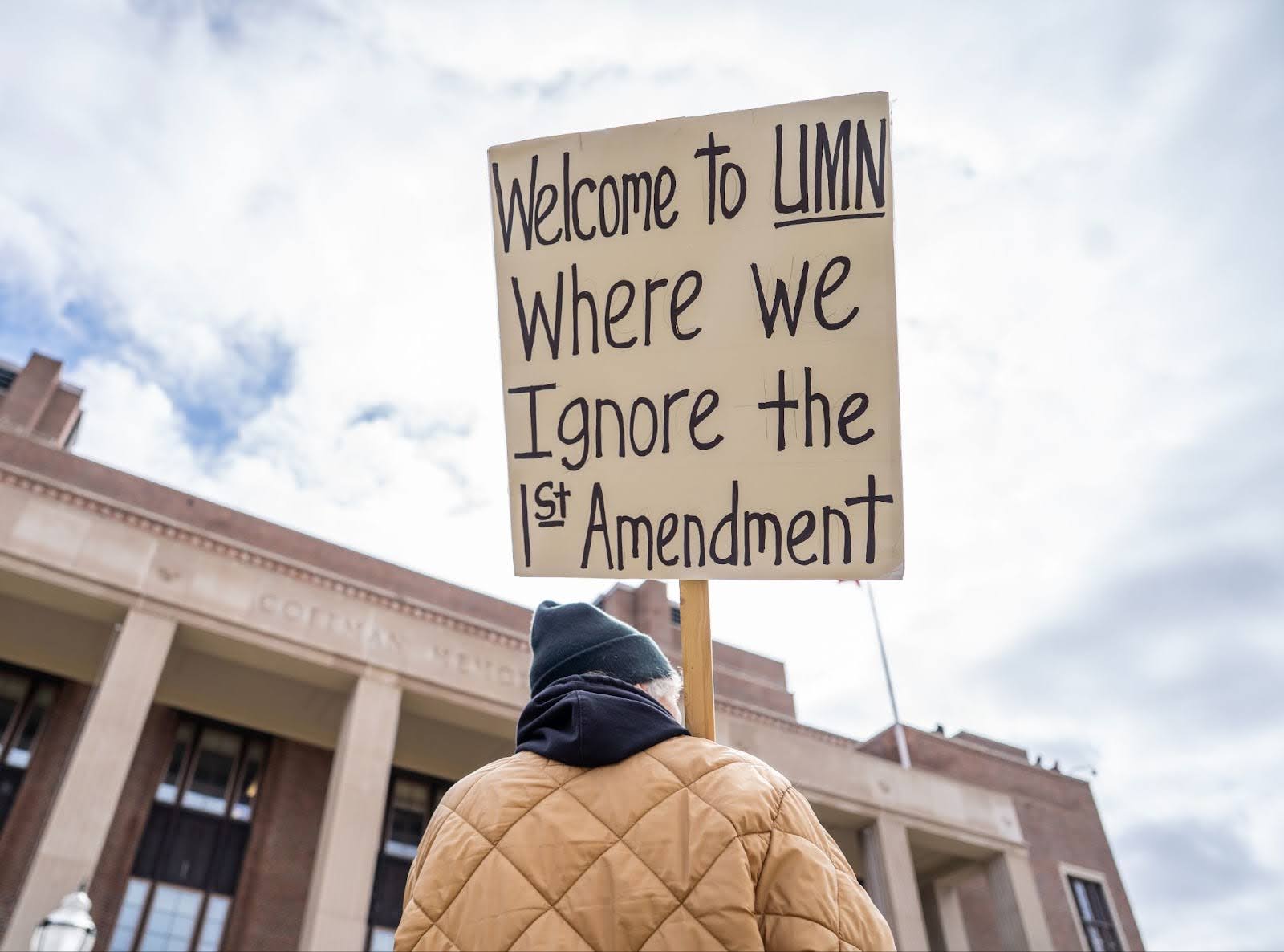Under the pressure of the Trump administration and protesting limits, students at the University of Minnesota say they’re confused, discouraged and scared to speak their mind.
Six years ago, to commemorate the 50-year anniversary of a full-day student occupation of Morrill Hall that created the country’s first African American and African Studies Department, Northrop Auditorium’s fourth-floor gallery opened an exhibit to “depict the power of student protest.”
Last summer, the power of student protest was restricted by university policy. Faced with an encampment on Northrop Mall protesting the war in Gaza, the university limited all protests to no more than 100 participants on designated campus spaces with a 10 p.m. curfew.
To many students, the policy exacted a cost, creating an atmosphere of distrust on campus by setting up rules counteractive to the purpose of protesting.
“Protests are supposed to show how many people want one particular change,” Sebastian Crea, a second-year student on the Twin Cities campus said. “If you limit that to 100 people, that makes the entirety of the purpose of the protest pretty pointless.”
Now, as universities come under broader attack from the Trump administration, fears about protesting are exacting a deeper cost among students – a confusion that strikes at the heart of their development as young citizens in a free society, they say. In interviews, some students reported feeling both discouraged and scared to speak their minds freely on campus.
Ali, who asked to only be referred to by their first name, is a second-generation immigrant and fourth-year student at the university. Ali has organized many of the protests on campus, specifically those about the war in Gaza.

Due to the possible risks and police involvement, Ali said organizers have deemed it necessary to warn international students about participation.
“We even told international students not to come to protests. It’s not safe for you guys right now. We advise them all the time,” Ali said. “We made an announcement, ‘Hey, if you’re an international student, it’s your time to leave. Before we get to the area, there’s gonna be cops there. You might get arrested and you might get deported.’ There’s really no due process anymore in this country. So it’s not worth it to risk it for anything.”
A community forum for academic freedom spoke on issues relating to free speech and academic freedoms on college campuses. The panel, made up of faculty and staff from across the university, expressed their overwhelming concern for international students and free speech.
Jane Kirtley, a media ethics and law professor at the university, described the current atmosphere in the United States as “perilous.”
“I find it so troubling that a few years ago, our advice to international students was ‘Be careful about what you’re posting on social media and so forth, because your home country may not like it,’” Kirtley said. “But we’re kind of in a wait-and-see mode right now. There are a number of cases that are being litigated around the country right now, some of which turn on the very critical question of whether grounds for deportation can be based on expressive speech.”
Some students say they are struggling to balance their desire to be politically involved and their fear of retaliation by the university and federal government.
“It can be very empowering to share our experiences. But there is also some sort of a fear factor, especially with what’s been going on on campus,” Noemi Rosas, a third-year student at the University, said. “I sometimes do feel fearful of voicing my opinions, because I don’t want my aid to get taken away, be suspended, expelled, or anything negative to happen.”
An AccessU survey sent out to University of Minnesota students found that by a measure of 2-1, respondents said they doubt they can confidently express their right to free speech and protest at the University of Minnesota. The respondents largely attributed their doubt to university policies. Others cite Trump administration actions.
The survey, sent to 5,000 randomized degree-seeking undergraduate emails, had a 5.3% response rate, which is just within the acceptable range of providing generalized insights about student attitudes.
“Remember that journalists, lawyers, academics and others are all in the Trump crosshairs right now,” Kirtley said. “None of us are secure. If that’s any comfort to you, you’re not alone.”
Mimi Vo, a student at the University and a second-generation immigrant, said the recent deportations are a cause for concern because the demographic targets are broadening, regardless of due process guarantees.
“I believe that being born in America makes me safe, but I don’t have any way of proving that,” Vo said. “First, they go for the Latinos with tattoos. Next, they go for anybody that’s not white. So, yeah, I feel like there’s reason to be afraid of that happening.”
In a press conference on March 28, Secretary of State Marco Rubio affirmed that the Trump administration would revoke visas or deny visas to international students who intend to “create a ruckus,” in response to the detainment of Tufts’s student Rumeysa Ozturk.
“If you apply for a visa to enter the United States and be a student, and you tell us that the reason you are coming to the United States is not just because you want to write op-eds but because you want to participate in movements that are involved in doing things like vandalizing universities, harassing students, taking over buildings, creating a ruckus, we are not going to give you a visa,” Rubio told reporters.
No evidence of anti-Semitism or terrorism was found by the Office of the State Department linked to Ozturk, according to an article by the Washington Post.
Diya Hariharan, a student at the University of Minnesota and a first-generation immigrant, said doubt about safety is especially apparent with the threat of arrest and ICE involvement on campus after a graduate student at the University of Minnesota was arrested in March.
“Any time I’ve heard anything about people protesting and being arrested, there’s that increased level of fear where, if a grad student who had a DUI can get arrested and potentially deported, how do you know that that same thing can’t happen to you?” Hariharan said.
Tessa Ewer, a first-year student at the University of Minnesota, said she believes the university is trying to hinder protesters’ rights, not support them.
“They try to quiet people’s voices, and are trying to spread anti-protest rhetoric by twisting the protesters’ words into trying to make it look like the protesters are protesting something negative,” she said.
University spokesperson Jake Ricker said in a statement that the university is committed to students’ rights to protest on campus.
Ricker said the university “fully supports free speech and peaceful protest.”
University action, however, has eroded student trust, some students say.
Last spring, seven students were among nine people arrested on trespassing charges after activists built a 15-tent encampment on Northrop Mall. The encampment was cleared by the University of Minnesota Police (UMPD).
“The University of Minnesota has historically used excessive force to remove protesters,” Melody Colon, a second-generation immigrant, said. “I think the University will do whatever it wants to protect its monetary interest and the protection of students isn’t necessarily what makes them money.”
The university has not necessarily violated any First Amendment rights with its restrictions on speech, according to Timothy Johnson, a professor of political science and law at the University of Minnesota. Campuses generally have a broad range of ability to restrict speech on campus if there is reason to believe protests will interrupt instruction or the functioning of the campus.
Free speech issues arise when restrictions on speech are not content-neutral. The Trump administration’s demand for a crackdown would be considered content-specific restrictions, Johnson said.
The White House has accused universities across the country of failing to protect Jewish students against anti-Semitism amid the protests against U.S. support for Israel in the war in Gaza. To address his concerns, Trump has made several demands to universities and threatened to pull federal funding if they do not meet those demands.
“Just because you are protesting in favor of protecting lives in Gaza does not mean you are anti-Semitic, necessarily,” Johnson said. “You’ve got to allow both sides to have free speech. Restrictions on free speech have to be content-neutral.”
Third-year student Luzia Stern said working as an organizer for the Young Democratic Socialists of America and sharing in the high emotions of the risk of protesting as a student on campus, she said she understands why more students are becoming angry or discouraged by the current administration.
“We need to be all on the same page and working towards a shared goal. So that has caused stress,” Stern said. “It’s just hard to balance things. I guess. For a while now, it’s been sort of coming in waves of like, I’m nearing burnout, and then I step back and I’m like, Okay, let me just focus on my life right now. You know, it’s hard as an organizer.”
Activism burnout is defined as when the accumulation of stressors associated with activism becomes so overwhelming that they compromise activists’ persistence in their activism, as a threat to the movement’s viability, according to “Fighting racism, battling burnout: causes of activist burnout in US racial justice activists.”
“This burnout is real and purposeful. The Trump administration’s current chaos is meant to prevent us from strategically resisting policies that prioritize profits over people – policies that harm our wallets, health, and communities,” according to an article by Rishya Narayana of the Conservation of Law Foundation. “It’s meant to make us feel isolated and exhausted.”
“I am very proud of the things I can share and I’ve learned,” Stern said. “I’m reading more, and I’m able to criticize when issues come up so that we can all work together and be efficient.”
Working together is going to be important moving forward as students work to overcome the challenges thrown their way by the government and their universities.
Eric Van Wyk, who is a part of the Faculty Senate Committee on Academic Freedom and Tenure, said the importance of speaking up is crucial as students and faculty continue to navigate this time of stress and fear on college campuses.
“I would encourage people to speak. I would encourage units to speak,” Van Wyk said. “I would push back on what is happening now and make it as difficult as possible for things like the current Board of Regents, not the policy, to play out and to make it as clear as possible.”
Byline: By Emma Ritter (Story Editor), Trent Curry (Writer), Katie Rohling (Socials Editor), Sophia Arndt (Story Editor) and Logan Anderson (Writer)

